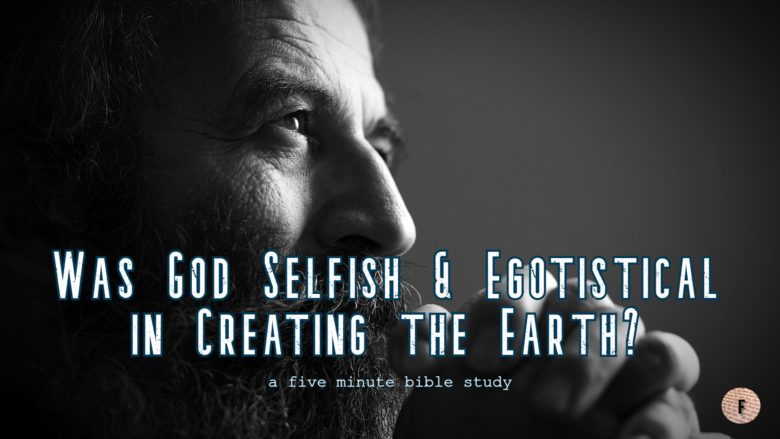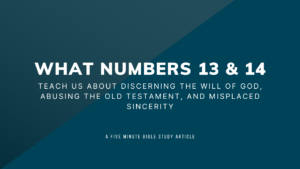Why Did God Create the World?
This question “Why did God create the world?” is most often posed by skeptics, whether atheist and/or agnostic, who have no interest in evidence for God’s goodness but only in tearing down the God of the Bible. However, sometimes sincere Christians have the same query; their motivations are not impure; they are not on a mission to shoot God down from on high. In fact, several times over the past few years I have been asked by Christians about God’s motivation for creating the universe, usually while taking new converts through studies in Genesis. It’s easy to read Genesis, look at all the evil bubbling over in the days of Noah and then wonder why in the world God would make a universe with potential for such wickedness. Does God just get jolly by sending people to hell? Is that why He created mankind? Or maybe He created Adam and Eve because He wanted to feel good about Himself. Imagine a bully who has an inferiority complex and makes himself feel good by picking on those smaller than him. Did God create these puny earthlings just so they would have to say His name over and over, bow down to Him, and repeat to everyone how good He is for the sake of boosting His massive ego? These are the questions that need answering.
Ruling Out Options
When we debate about God’s motivations for doing anything, we are trying to read the mind of God, a mind so infinite and complex that no supercomputer could come close to matching. We are talking about the mind that created DNA and subatomic particles we can only theorize about. Just the same, God has revealed His mind to us…in part at least.
1 Corinthians 2:10-12
10 But God has revealed them to us (prophets) through His Spirit. For the Spirit searches all things, yes, the deep things of God. 11 For what man knows the things of a man except the spirit of the man which is in him? Even so no one knows the things of God except the Spirit of God. 12 Now we have received, not the spirit of the world, but the Spirit who is from God, that we might know the things that have been freely given to us by God.
Some of God’s thoughts that have been revealed to us through the scriptures. But that doesn’t mean that everything has been revealed. Isaiah indicates as much when He states that “For as the heavens are higher than the earth, so are My ways higher than your ways, and My thoughts than your thoughts,” (Isaiah 55:9). Nonetheless, what has been revealed is for our knowledge and edification. With that established, we can at least accurately identify what the motivations for God’s creating the earth were NOT. We may not have enough at our disposal to know what all His motivations WERE, but we can at least use what He did give us to rule out obviously wrong answers and assumptions. This should give us some amount of closure on the questions at hand.
May I Ask You a Question?
Sometimes the best way to answer a question is to ask a question. In ruling out God’s motivations for creating the universe, let’s start with a couple of questions. Question 1: are you thankful to be alive? Most people would admit that at some point in their life they could answer this questions positively. Question 2: is being alive a blessing? I would have to conclude from all the prayers I have heard thanking God for life and calling it a blessing, most people would agree that it is indeed a blessing. Even atheists are happy to be alive, at least the ones that I know. Flip the virtual corner of the page down on this point; we will come back to it momentarily.
Next, consider God’s self-description in the Bible. “God is love” the inspired apostle John reports in 1 John 4:16. He goes on further in 1 John 3:16: “[God] laid down His life for us (i.e., sinners).” Based on these two facts that speak to God’s character, we can rule out the fact that God’s motivations for creating the earth were selfish. If God didn’t take on flesh and go through what He went through on behalf of His creation, then skeptics might have more of a case. But the fact that God gave us our lives, a blessing, and then took on flesh to be killed in our place, that shoots a major hole in the “God is selfish” narrative.
Why People Accuse God of Arrogance
Moving on, consider why people accuse God of arrogance. The reason people accuse God of being proud and egotistical is because they have never met someone who actually lived up to all the illustrious claims made about themselves. We describe humans that speak highly of themselves as prideful, arrogant, egotistical jerks. That’s because they are all imperfect creatures. The fact that God describes Himself in such lofty and perfect terms (see Job 40-41) and can get away with it is because He is the only being whose self-claims are actually true. We have no point of reference for this. And so we just assume God is like all the imperfect jerks we have met, the ones who couldn’t live up to their own hype. Romans 5:6-8 illustrates this fact of God for which there is no frame of reference for humans.
Romans 5:6-8
6 For when we were still without strength, in due time Christ died for the ungodly. 7 For scarcely for a righteous man will one die; yet perhaps for a good man someone would even dare to die. 8 But God demonstrates His own love toward us, in that while we were still sinners, Christ died for us.
Re-read those verses again. Christ died for people that didn’t deserve it. Normal people don’t substitute their own life for really good people, much less guilty convicts! But Christ did! He substituted His life for the life of guilty convicts! What was He thinking? Again, we have no frame of reference for this. As the popular idiom goes, that blows my mind. This all comes down to the fact that God isn’t proud and egotistical; humans are. We suck God’s air, drink His water, eat His food, and then have the audacity to call Him a selfish bully with a body complex.
One Last Question
Here’s one last related question before we wrap this one up. Sometimes sincere Christians ask, “Why didn’t God just create humans and put them in heaven with no tree of knowledge of good and evil? Why didn’t He just skip the earth part.” Let’s think about this thought process by using a human experience we can relate to. Who is the strongest person you know? By this I mean, who is the most mentally strong person you know? The strongest people I know are the ones that have gone through the greatest trials and the most severe struggles. The fact is, trials are the main factor that give these people their incredible perspective on life. The writer of James attests to the incredible blessing and growth that come from trials (1:2-3). Wouldn’t it be nice to have the perspective of a cancer patient without having to go through the pain and struggles of cancer? But we know this is impossible. You can’t appreciate experiential knowledge and wisdom without going through the experience; it’s in the name. Experiential wisdom is found only in the experience. With that said, why does no one like a spoiled child? Because he gets everything he wants without having to experience the struggles and pains of labor. As a result, spoiled children aren’t thankful for what they have. They take life for granted. If some people got their way and God elected for heaven without the trial of earth beforehand, heaven would be full of hellions: a bunch of unthankful people who didn’t have to struggle and appreciate the blessings of God. The whole convoluted thought process that ends with unthankful people in heaven is predicated on the idea that trials are a curse instead of a blessing. Trials are not a curse. Trials prove and improve the Christian who has a godly perspective. Embrace trials.
Conclusion
Perhaps it is best to take the descriptions of God from holy scripture and realize that God’s choice to make the universe the way it is was the best choice. God could have made a million different universes, but He made this one. And if you think this one is bad and unfair, then imagine if we let the president of the United States, or Mahatma Ghandi for that matter, choose the best universe option. No, I’m glad God made that choice, and it’s God who is in control of the seen and unseen realms. No one else would have laid down their life for the very creation that hated Him. Let us love Him, because He first loved us and gave Himself for us.



